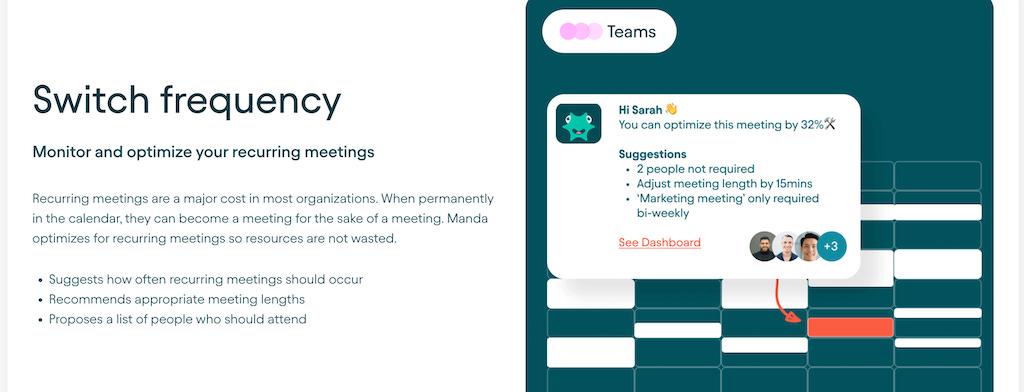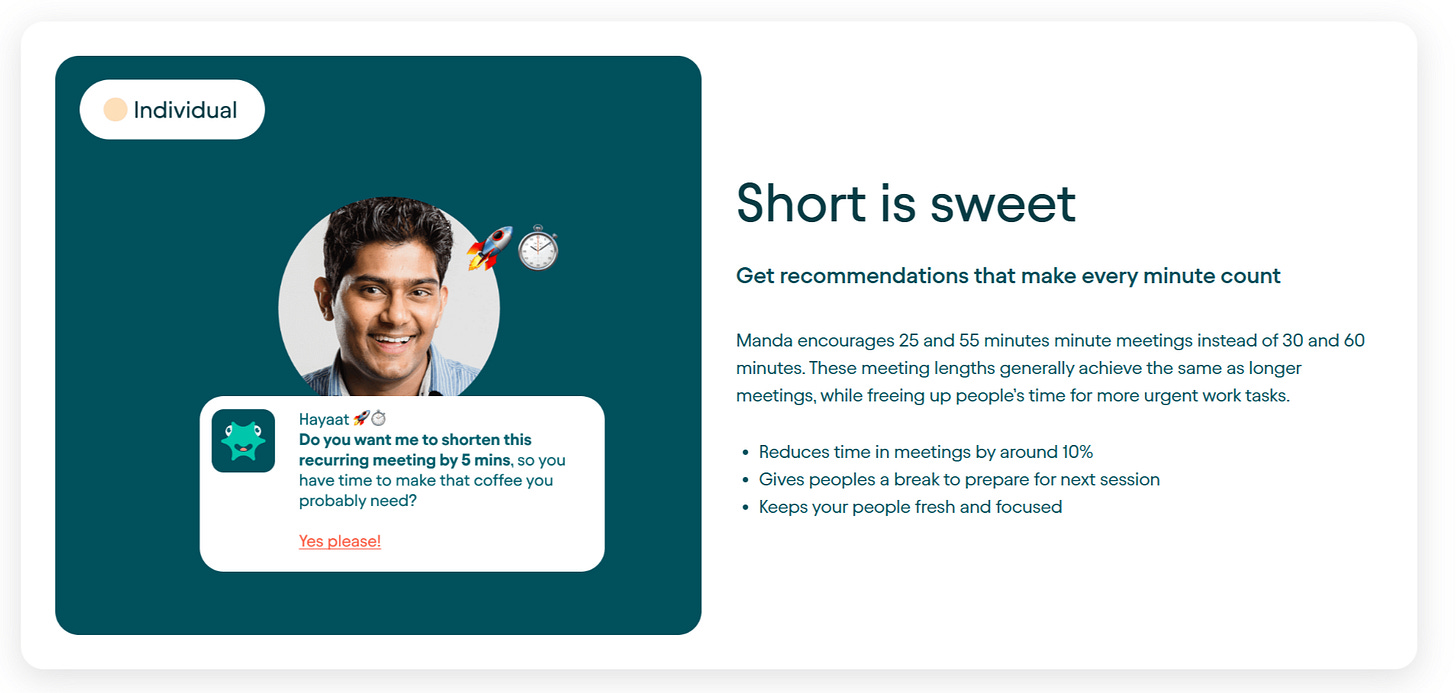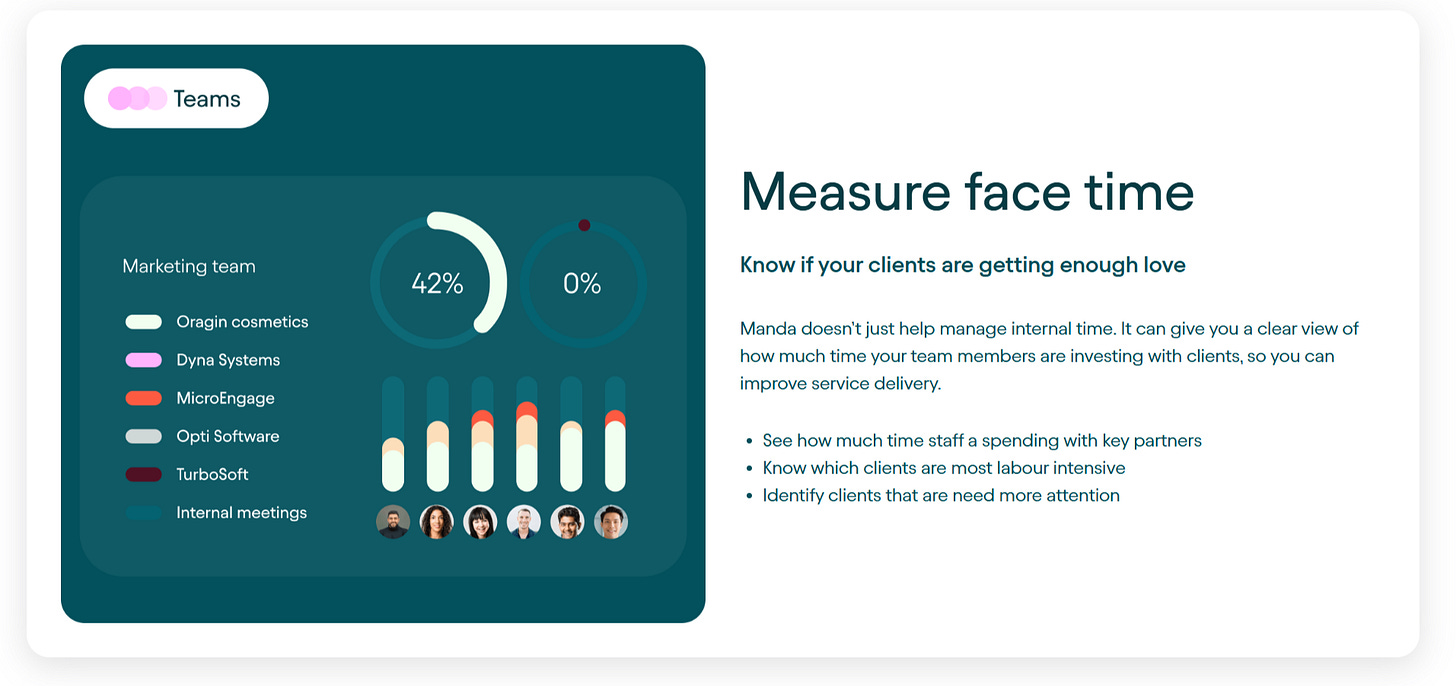When Time is More Than Money
Today's featured startup is using AI to revolutionize company meetings.
Project Overview
Project Manda is a platform designed to help companies build and maintain a culture of effective meetings.
The problem is clear: employees spend an average of 500+ hours a year—26% of their working time—attending meetings. For a company with 2,000 employees, this translates to a staggering $80 million annual cost.
While meetings are a necessary part of business, they don’t have to be as time-consuming. Project Manda optimizes meetings to make them both shorter and more effective. The platform provides companies with tools to structure their meetings more efficiently.
Here’s how it works:
Limits participant count. Research suggests that meetings should have no more than eight attendees for maximum efficiency. Project Manda reviews invitations and suggests cutting unnecessary participants, explaining why they may not be needed.
Reduces recurring meetings. Many meetings happen on autopilot—weekly check-ins, for instance. The platform analyzes patterns and recommends reducing meeting frequency, shortening duration, or trimming the participant list.
Forces structured agendas. Organizers must send a pre-meeting agenda outlining key discussion points and proposed action items. This ensures time isn’t wasted on introductions and that meetings focus on decision-making.
Encourages shorter meetings. Instead of defaulting to 30- or 60-minute slots, Project Manda nudges organizers to schedule 25- or 55-minute meetings, freeing up valuable time.
Provides meeting efficiency tips. Organizers and attendees receive ongoing recommendations on how to make meetings shorter and more productive.
Importantly, these optimizations apply not only to internal meetings but also to client-facing interactions. While external clients likely won’t receive behavioral suggestions, who knows—maybe they should!
With over 14 million meetings analyzed, Project Manda has helped reduce average meeting time per employee by 12%, saving its clients more than 72,000 hours of working time. Major companies like Netflix, Salesforce, and Zendesk have already adopted the platform.
Pricing starts at $8 per employee per month. Individual users can access the platform for free, while large enterprises can negotiate custom plans and additional features.
Project Manda recently secured $2 million in seed funding. Originally from Australia, the startup is now expanding into the U.S. market.
What’s the Gist?
Inefficient meetings are often cited as the #1 productivity killer in companies—ranking even higher than unclear goals. And excessive meetings come in at #3, above even employee motivation issues. The struggle is real.
Why do meetings have such an outsized impact? Because employees spend 57% of their work time not working, but communicating about work—through meetings, emails, and messaging apps.
Unlike emails, which consume the time of just the sender and recipient, meetings tie up every participant’s time. This is why even a small reduction in meeting load significantly boosts overall productivity.
During the pandemic, meeting time skyrocketed. Many assumed it would shrink back afterward—but the opposite happened. Between 2020 and 2023, time spent in meetings increased by 250% (3.5x growth), while time spent in chats grew by only 32%
For companies, the financial impact of excessive meetings depends on the salaries of participants. This is why startups like Zeck, which raised $7.5 million, focus on streamlining board meetings—where C-suite executives and directors participate, making these some of the most expensive meetings in business.
Zeck’s approach? Force participants to prepare in advance—by compiling all necessary information into one platform, allowing for pre-meeting voting, and ensuring attendees can review everything on their phones anytime.
Fun fact: Zeck’s founder is actor Edward Norton, best known for Fight Club.
Key Takeaways: Where’s the Opportunity?
Selling to large enterprises is always a smart move. Big companies have big budgets and strong inertia—once they integrate a tool into their workflow, switching away requires effort. That means stable revenue and high retention rates.
But what do you sell to corporations that seem to have everything?
Project Manda offers a surprising answer: sell them time. Large organizations have too many meetings, too many attendees, and too much wasted time. Even a 10–15% reduction in meeting time translates into major cost savings.
For example, one of Project Manda’s largest clients saved the equivalent of $600,000 per year in recovered employee time.
This points to a broader opportunity: building productivity platforms that reduce inefficient communication. Beyond meetings, this includes internal messaging, email management, and workflow automation.
It’s a lesson that Amazon’s Jeff Bezos once emphasized. Frustrated by endless discussions on improving corporate communication, he once stood up in a meeting and declared:
“You’re all saying the right things—but you’re wrong in the main point! Communication is a sign that an organization isn’t functioning efficiently. If work happened naturally, we wouldn’t need so much discussion. Instead of improving communication, we need to fix the underlying processes.”
That’s the real insight: communication inefficiencies aren’t just a symptom of bad habits—they’re a symptom of broken processes. The real opportunity lies in redefining how companies work, not just how they communicate.
Company info:
Project Manda
Website: projectmanda.com
Latest Round: $2M, 27.03.2025
Total Funding: $2M, Round 1













